#hang on. does reckless even pass the bechdel test??????
Explore tagged Tumblr posts
Text
the alder elves as villains and the increasing involvement of all of these immortal beings in the plot of golden yarn were already bothering me on my first listen but i only recently realised why it was so disappointing to me. in the first two books, everything has its rules and its price. the consequences to the characters’ actions felt real and carried actual weight. the immmortals, however, seem to stand above these rules somewhat. i already disliked the introduction of miranda, because i find that the more grand and important you push your story to be, the more disappointing the ending tends to be. (also, can we get a female character that is not at one point or another involved in a love triangle? thanks!)
the worst thing for me personally about the alder elves was the fact that Spieler (i honest to god hope that his english name isnt ‘player’) was revealed to have orchestrated some of the events that led the characters to where they are in golden yarn. which is so frustrating, because few things are as hard as creating characters that feel like they have actual agency and arent just strung along by the plot. also, part of the appeal, i suppose, is that in the first two books, jacob and will are just ordinary people to whom extraordinary things have happened, and not because they are the distant relatives of some elusive personalities (read: chosen ones). which could also be counted towards the ‘too grand’ point i made above.
these books mean a lot to me, so please dont assume im complaining for complaining’s sake. its just sad to see the things that i loved about the first books being overwritten by the new ones.
#yes i listen to the audiobooks.... rainer strecker youre my only ho#hang on. does reckless even pass the bechdel test??????#txt#complains about golden yarn#golden yarn#das goldene garn#reckless series#mirrorworld series#opinions
6 notes
·
View notes
Text
Marvel Cinematic Universe: Spider-Man: Homecoming (2017)
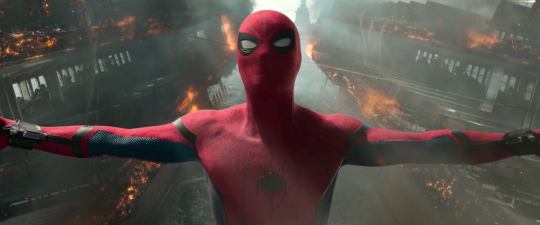
Does it pass the Bechdel Test?
Yes, twice.
How many female characters (with names and lines) are there?
Eight (34.78% of cast).
How many male characters (with names and lines) are there?
Fifteen.
Positive Content Rating:
Three.
General Film Quality:
Neither characters nor plot are engaging enough to hold strong interest, making the film feel longer than it is, plus there’s one character in particular whose behaviour seriously rankles. It’s not a terrible movie, but it is thoroughly uninspiring.
MORE INFO (and potential spoilers) UNDER THE CUT:
Passing the Bechdel:
Liz manages a brief pass with her mother before the dance. Liz says goodbye to Betty.

Female characters:
Betty Brant.
Liz Toomes.
Michelle.
Marjory.
May Parker.
Karen.
Mrs Toomes.
Pepper Potts.
Male characters:
Adrian Toomes.
Mason.
Peter Parker.
Happy Hogan.
Tony Stark.
Jason Ionelli.
Ned.
Flash.
Abraham.
Mr Delmar.
Gary.
Steve Rogers.
Coach Wilson.
Shocker.
Aaron Davis.
OTHER NOTES:
Ah, here’s Peter’s video log from Civil War, where he has no idea why he’s even there and it’s completely irresponsible and inappropriate for Tony to have brought him in on something catastrophically dangerous with no preparation and none of the knowledge necessary to make an informed decision! I hate it. This makes me extremely hate Tony. I know I mentioned it already when I reviewed Civil War, but it’s super-true and not going to change any time soon.
See, this thing where Peter is sacrificing academic and social experiences to hang out for Tony’s promised phone call? That’s on Tony. You can’t just rope a kid into your bullshit and then kick him back out into the world with a vague false promise and no follow-up of any kind. That’s not how kids work. It’s not fair to people in general, but it is especially not how kids work.
Peter having to run because he’s in the suburbs and there are no tall buildings is probably the best gag in this movie.
The inclusion of that little detail about the Washington Monument being built by slaves. Mmmhmm.
I find the plotting of this film very dull and predictable, like ‘oh, and now we’ll have another action set piece, now some cutesy highschool stuff’, etc, and as such I feel it drags excessively and I’m just sitting here waiting for each bit to be done with so that we can get to the next, so that it can be over too, because I’m not attached enough to any one or thing that’s happening for the predictable beats to hold internal interest. That said, the Washington Monument piece is pretty good.

The ludicrous ferry accident, not so much.
Tony shows up, lot of shit-talking, blaming Peter for not magically intuiting information which Tony didn’t give him. Urgh. I deeply, deeply hate this version of Tony.
Toomes reveal is the most inspired choice of the film. Keaton kills it on Toomes’ own revelation of Peter’s identity.
This movie sure does go on.
This ‘screwed the pooch’ joke makes me want to bleach my ears. Also, this whole Avenger/press conference business is still Tony completely failing to appreciate how he’s upended this kid’s life; the right thing to do in this situation is not to lean into it and go ‘ok, but what if I upended it...more?’, just like the right way to deal with it was emphatically not to just kick the kid to the curb to figure things out for himself after that initial upending. I imagine I would have enjoyed this film sooo much more if I were not raging at Tony throughout.
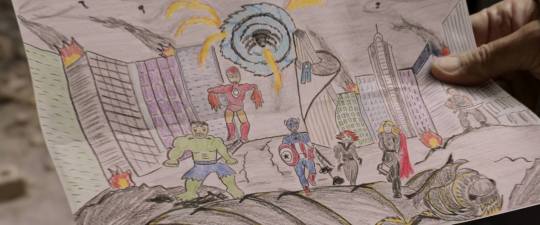
Ok, let me just purge on the Tony thing before I go any further, otherwise I’m never gonna be able to focus properly on the rest of the movie. I hate what they’ve done with Tony. That’s obvious. I really, deeply disagree with it. Tony was a hard character to get to like, but the Iron Man films did really solid, intelligent work at achieving it despite the many and sundry hurdles, and the key to that was the fact that they had Tony, consistently, recognising the ways that his actions hurt others and then making the effort to fix that and fix himself, not just blowing it off, making some flashy gesture or throwing some money at the problem and then breezing on out like everything’s fine and none of it’s on him. The Avengers films - particularly Ultron - did significant work at tarnishing the character development of the Iron Man films, and then Civil War came in and - amidst the many, many sins Tony committed in that movie - handed the introduction of Spider-Man over to Tony in an act of incredibly irresponsible and reckless child endangerment, which this film proceeded to double-down on by having Tony completely fail to be a reasonable, thinking adult at any point. Frankly, I don’t feel that Tony’s initial decision to involve Peter in Civil War is forgivable, there’s no walking that back, but the least he could have done is to recognise that fact and make appropriate amends, which - as above - does not mean ignoring the kid any more than it means pandering to his hero complex. It makes me feel really, really old to be saying it, but Peter is a minor, he doesn’t have a strong perspective on the world yet, but he’s also old enough and wise enough that he can’t just have people throwing rules at him and expecting obedience; he needs to be treated with the respect of having things explained, but he also needs oversight because he isn’t mature enough to make choices without it. He needs guidance. That’s the position which Tony actively puts himself in and then fails to follow through on, and it leaves Peter feeling that he has to prove himself, that he has to further endanger himself in order to win the mentorship that Tony promised. As a character response and an emotional position for Peter, that’s great story fodder and logical follow-on from his introduction, and I can’t fault that. For Tony Stark though, who manages to both start and end this movie without actually learning anything, it makes me infuriated beyond belief.
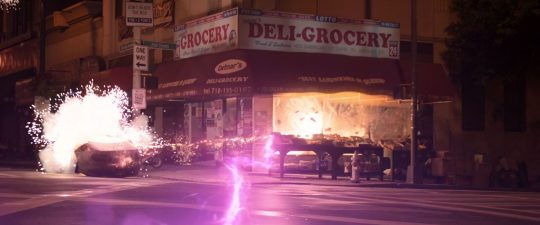
THAT SAID, let’s segue to the natural place: to Peter. The good news is, if this film gets only one thing right, it’s that very precise balance of Peter’s age, with all its accompanying tumult; Peter is mature enough to feel like he’s in control of his life and choices and capable of taking on new, big, adult things, but not mature enough to realise the limitations that come with his age in terms of experience and worldview. He has that ‘teenagers think they know everything’ factor, but without it being conveyed as either too arrogant or too whiny to be palatable. It’s a tough ask for teen characters, generally, as the creative forces behind them are almost invariably adults (and usually have been for quite some time), and it’s hard to recapture the mentality of a teen once you’ve grown beyond that mentality yourself. When Peter declares that school doesn’t matter anymore because he’s ‘probably never coming back’, he’s gonna become an Avenger and that’s his whole life plan right now, no real details, no clarity in what exactly that means for his day-to-day life or where he gets his income or how things might go in the long term, that’s a classic teen moment for him: his future is a concept, all of its parts internally encompassed, and it’s not just that he dismisses the questions, logistics, and concerns that an adult would know to raise, it’s that these things don’t even occur to him in the first place. Peter is in this middle-position, the transition from child to adult, and he’s not as far through that transition as he thinks he is (teenagers never are). Altogether, I may not be enamoured by this film, nor am I especially compelled by Tom Holland’s take on this character (he’s not bad, he’s just...not that enthralling, either), but the particular pitch of Peter’s mentality is spot-on without being, in itself, just another tromp through dull and overwrought teen-angst cliches.
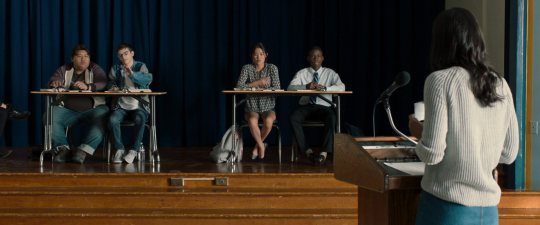
The rest of the movie, on the other hand...I feel kinda bad about spending that over-long first paragraph railing against a certain billionaire who could have done us all a favour and not been in this film (or at least, not as prominently), giving Peter more of a chance to explore his spider-self and what it means to his life on his own terms, instead of being so heavily influenced by how he fits into the wider universe, and then maybe we could have fleshed out more of Peter’s normal life in order to make all the extraneous pieces of this story more meaningful, and less, y’know, extraneous. As-is, I don’t feel like I’ve got a lot to say about it, it’s fairly generic and unremarkable, and while there are some good set-up pieces - Toomes’ whole descent-to-criminal-enterprise-due-to-economic-pressures thing has great narrative potential and scope for reflection upon capitalism in the real world - the story never explores any of those pieces enough to even half-ass a real analysis of the idea. Toomes is rendered a mostly stock villain, the same as Liz gets little to make her more than a bland Love Interest, May is an interchangeable maternal figure, and Ned - while fun and easily a highlight in a cast that’s hardly vying for the title - is also a bit of a heavy-handed stereotype sitting in the comic relief/sidekick chair (the fact that he essentially references this in-story, fourth-wall-denting style, does not make it less uninspired). And I’m not sure how we’re supposed to see Zendaya’s MJ as anything other than a gimmick at this point, kinda seems like she was literally only there so that her preferred name could be used as a weightless ‘reveal’ at the end. Like I said up in the notes, I found the movie to be excessively predictable in a bad way, bringing me out of the viewing experience to count off the minutes and story beats, and as such, even though this is not the worst film Marvel has churned out to date, it is one of my least favourites. I know there are a lot of people who loved it, who love Tom Holland’s version of Peter Parker and found this movie light and fun, and it’s not that I can’t see where they’re coming from with that...I guess it’s just that whatever parts of the story are self-contained are so recycled from so many other films of this ilk, I can’t find anything to attach to, and then the rest of the story which could have been spent making something a little more interesting from those basic, predictable bones, instead is wasted on an over-emphasis on placing this movie into the MCU’s larger framework (an ironic waste of resources since you can easily skip this film without getting confused watching the next MCU movies with Spider-Man in them, Infinity War and Endgame). Anyway. I fear I’m just gonna start repeating myself for lack of anything else to say; I don’t care for this movie, it had at least a good little piece of heart in it but it wasted too much time on things which did not enhance this story or the wider universe anyway, I hate Tony Stark now. The end.
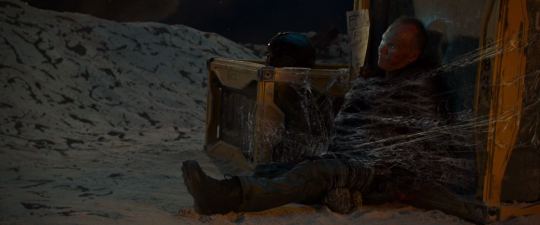
5 notes
·
View notes
Text
Marvel Cinematic Universe: Thor: The Dark World (2013)

Does it pass the Bechdel Test?
Yes, at least four times.
How many female characters (with names and lines) are there?
Four (23.52% of cast).
How many male characters (with names and lines) are there?
Thirteen.
Positive Content Rating:
Three.
General Film Quality:
Surprisingly dull.
MORE INFO (and potential spoilers) UNDER THE CUT:
Passing the Bechdel:
Darcy tells Jane about the scientific anomaly. They check it out together. They pass when Jane reappears. Frigga instructs Jane. To be honest, I forgot to notice if they actually passed once Jane came back to Earth, but it’s ok because we already confirmed that the film achieved multiple passes anyway. There were definitely some.

Female characters:
Sif.
Jane Foster.
Darcy Lewis.
Frigga.
Male characters:
Malekith.
Bor.
Loki.
Odin.
Thor.
Fandral.
Hogun.
Volstagg.
Richard.
Ian.
Heimdall.
Algrim.
Erik Selvig.
OTHER NOTES:
Odin is encouraging Thor to have a relationship with Sif, aka his One Female Friend. What a cliche. It comes to nothing in any direction and I don’t know why they bothered to even mention it.
They bother to give Frigga something to do (ever-so-briefly) in this movie, just in time to kill her off. Nice.

They spent so much time having Thor and Loki trade quips while they’re escaping Asgard, I straight-up forgot that Jane was there. Bad editing, y’all.
Erik is ~crazy~ and then he sees the convergence is happening and he’s spontaneously better and it’s all just very...poor.
Thor’s whole take-the-aether-to-Svartalfheim plan goes astronomically badly and I feel like they kinda...gloss over that. He and his buddies all commit treason, they deliver the aether straight to Malekith, and Loki DIES (as far as Thor knows, anyway). It’s just kinda weird that they don’t take a moment to be like ‘wow, really fucked that one up’, y’know, lean in to the emotion a bit, give it some weight? I feel like they played Frigga’s death like it was the more desolate moment, which is nonsense from both a narrative perspective, and in terms of character (since the audience is three films in with fan-favourite Loki, as opposed to this being Frigga’s second appearance but the first in which she actually did anything (recall in the first film she was not actually given a name, let alone anything to do)). Whatever.

I’m not gonna linger overlong with this one, because there’s really not a lot worth saying. For the ladies, I will say this: I think all four of them have more utility in this film than they did in the first Thor. Jane is less prominent than last time, but she gets to do more than just talk excitedly about science this time (though for the middle portion of the film, she is rendered a damsel and spends a lot of time either unconscious or just weirdly silent and being totally forgotten by narrative and audience alike (pro tip: reaction shots of all involved parties are important. No one is ever just hanging on the sidelines of a major action event doing and thinking and responding to nothing). Nevertheless, she gets to actively participate in science-ing a way to win the day at the climax of the film (using Selvig’s tech, admittedly - I can’t give points to any aspect of Jane’s handling in this film without also adding a caveat), and at least that’s better than standing around yelling and wringing her hands over Thor? It’s something.

When I say Sif had more utility this time, that’s...maybe an exaggeration. She had about the same amount as last film, really: she does at least one (1) thing in her function as ‘one of Thor’s group of friends’, and she gets at least one (1) scene where she has a personal conversation of some description with Thor so that the film can play with the possibility of using Sif as a love interest. It’s not a thrilling effort, and I can’t pretend that there’s any real evidence of a character there, just a placeholder standing in until someone with an actual personality shows up to take over (it doesn’t happen). Darcy continues to be that mix of fun and annoying that only sometimes works as comic relief, but at least this movie gives her some minor action to perform (getting Selvig out of the psychiatric facility) as opposed to just tagging along being chatty for the sake of it all movie long. It’s not much - and frankly, Selvig’s whole storyline is useless - but at least it allows anything at all to be happening on Earth while Jane and Thor are away. It’s...something.

And then there’s Frigga, who, as noted, is briefly given something to do so that the film can shore up some meagre emotional capital in order to buy a fancy funeral scene and some tasty manpain for our Asgardian royals. Yippee. An inordinate amount of attention is given to the death of a relatively minor character with whom the audience has been given little opportunity to forge an attachment, and while it works fine enough at that point in the film, the fact that the movie never reaches that same tempo again is egregious. Normally, the primary emotional intensifier in the film is the event which prompts the final act, but this movie misplaces that event way early with Frigga’s death and then Thor’s treason-plan which ensues; there’s a whole other action set-piece on Svartalfheim and ANOTHER (much more major) character death, and THAT is what spurs the final act of the film, but it is handled in a much more low-key (pun not intended) fashion, with very little response from the characters past the immediate moment. After Loki’s death, there’s no evidence that Thor is particularly bothered, there’s no indication that he’s emotionally driven to avenge his brother (or his mother, now, because we already spent that arc) by defeating Malekith at last, and there’s no hatching of a reckless Hail-Mary ploy to beat the bad guy, they just kinda...go and plant some gravitation rod thingies. Wowzer. The primary emotional intensifier of the film happens at the half-way point with Frigga’s fridging, and there’s not nearly enough fuel in that to keep the story running to the end.

Essentially, this is the problem with the entire film: it has no emotional cohesion, and that renders events that should feel compelling/exciting/original perfunctory and empty instead. It also has the same problem as the first Thor in that the majority of the characters feel flat and fairly meaningless as individuals, existing more as plot devices than anything else, but unlike the first film this one doesn’t even muster a good villain plot (Christopher Eccleston’s Malekith has presence, but he isn’t given anything dynamic to work with, he’s literally ‘evil, because’. Also, I’m annoyed that they had Adewale Akinnuoye-Agbaje as Malekith’s lieutenant and failed to do anything cool with him as a character, he’s just The Muscle (who is also ‘evil, because’)). The adventure to Svartalfheim is the best part of the film because it has the sense of escalating stakes that the actual final act lacks, so it’s the only time that the tone of the film feels like it’s on-track, plus it is notably the only time that the narrative utilises Loki (fan-favourite character and easily the best asset from the first film: you kinda want to lean in to that - the other best character from the first movie, Heimdall, remains woefully underused this time around). Once Loki is out of the picture and Thor’s not real worried about it and the characters on Earth are fooling around with planting a handful of itty flimsy spikes in Greenwich to disrupt the cosmic alignment of the nine realms (who knew it was that easy?), the film lapses into the same old predictable beats with no emotional core, and while there’s some basic fun in the portal-hopping of the film’s climax, there’s no sense of any genuine jeopardy for any of the characters, nor is there a clear idea of what they actually have to do to beat Malekith or how that can be achieved, so the action isn’t building toward anything more defined than ‘super-powered aliens whaling on each other’. As the MCU already learned (but evidently, failed to internalise) after The Incredible Hulk, just having rubber characters bounce around breaking stuff and being invulnerable until it becomes convenient for them to stop does not a good finale make. Well. At least this movie isn’t as ridiculously contrived as Iron Man 2? It’s less fun, though, and for all its spectacle, it’s not even as good as the first Thor movie, and considering how very generic that film was? That’s a dire conclusion. The MCU track record for sequels is presently, not good. Just you wait, though - we’re about to have an exception to the rule.

3 notes
·
View notes